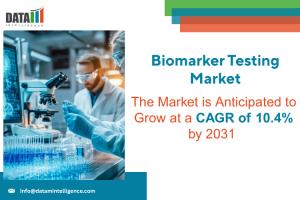Biomarker Testing Market to Exceed USD 122.8 Billion by 2033 | DataM Intelligence
Biomarker Testing Market- Innovations in genomics, rising chronic disease incidence, and collaborative ventures propel global growth
Download the sample Copy to explore key trends, innovations shaping the digital pills for mental health market: https://www.datamintelligence.com/download-sample/biomarker-testing-market
Market Overview and Growth Drivers
The biomarker testing industry has experienced significant growth as a result of advancements in bioinformatics, proteomics, and genomics. Key growth drivers include:
• Precision Medicine Adoption: In order to guarantee that patients receive the most effective treatments possible, clinicians and researchers are increasingly utilizing biomarker testing to personalize medications, particularly in the context of cancer.
• Rising Chronic and Infectious Diseases: The significance of early and precise detection is underscored by the increasing prevalence of infectious epidemics, Alzheimer's disease, cardiovascular issues, and cancer.
• Technological Innovations: High-throughput screening, multiplex assays, and next-generation sequencing systems have substantially reduced turnaround times and increased sensitivity, thereby making biomarker profiling more accessible.
• Regulatory Support: Clearer biomarker qualifying requirements have been published by the U.S. Food and Drug Administration (FDA) and Japan's Pharmaceuticals and Medical Devices Agency (PMDA), which has facilitated the swifter adoption of these markers in the clinical setting.
• R&D Investments: In order to expedite the development of medications and prevent late-stage clinical trial failures, pharmaceutical and biotechnology companies are investing significantly in biomarker identification.
Regional Outlook
North America
The biomarker testing market is primarily dominated by North America, which accounts for approximately 40% of global sales. This leadership is predicated on a robust research infrastructure, significant healthcare expenditures, and the widespread utilization of companion diagnostics in the treatment of cancer. The region's pioneering significance is underscored by the ongoing conduct of large-scale biomarker-driven clinical studies by major university medical facilities and cancer institutes.
Europe
Europe has the second-largest proportion as a result of effective public-private partnerships. The Horizon Europe initiative of the European Union offers substantial funding for biomarker research in a variety of diseases, such as multiple sclerosis and breast cancer. Additionally, the rapid approval of biomarker assays is facilitated by the substantial regulatory support that firms receive in countries such as the United Kingdom, Germany, and France.
Asia-Pacific
The Asia-Pacific region is the fastest-growing category as a result of the expanded disposable income and enhanced healthcare facilities. Japan, China, and South Korea are initiating national genomics initiatives to integrate biomarker testing into standard healthcare. China, in particular, is making substantial investments in digital pathology systems and precision oncology laboratories, which are propelling market growth. Biomarker endpoints are also being adopted by India's expanding clinical trial sector in order to adhere to global standards.
Industry Momentum: Mergers, Partnerships, and Growth 2024–2025
As the biomarker testing space becomes more competitive, companies are forging alliances and executing mergers to enhance their technological capabilities and broaden geographic reach:
• Roche & Foundation Medicine (March 2024): Roche completed its acquisition of Foundation Medicine, strengthening its portfolio of genomic profiling assays and companion diagnostics.
• Thermo Fisher Scientific & QIAGEN (July 2024): Thermo Fisher formed a strategic partnership with QIAGEN to co-develop next-generation sequencing panels for rare disease biomarkers, leveraging Thermo Fisher’s instrumentation and QIAGEN’s assay expertise.
• Illumina & GRAIL (January 2025): Illumina finalized its merger with early cancer detection company GRAIL, integrating liquid biopsy technology to accelerate non-invasive cancer screening programs.
• Bio-Rad Laboratories & Pacific Biosciences (September 2024): Bio-Rad acquired Pacific Biosciences’ high-accuracy sequencing module, aiming to enhance its digital PCR-based biomarker assays.
• Agilent Technologies & OncoDNA (February 2025): Agilent entered into a co-development agreement with European precision oncology firm OncoDNA to expand biomarker panels for personalized cancer treatment.
Competitive Landscape:
The major global players in the market include Merck KGaA, Abbott Laboratories, Thermo Fisher Scientific Inc., Q2 Solutions, IQVIA, Inc., QIAGEN N.V., Bio-Rad Laboratories, Inc., Illumina, Inc., Labcorp Drug Development, Quanterix Corporation, and among others.
Latest Developments
Beyond strategic consolidations, recent technological breakthroughs and real-world applications continue to reshape the market:
• Liquid Biopsy Advancements: Companies are developing blood-based diagnostics that are highly sensitive and can detect circulating tumor DNA (ctDNA). This technology enables the early diagnosis of recurrence and the minimum residual disease surveillance in cancer patients.
• Multiplex Proteomic Assays: The simultaneous measurement of hundreds of protein biomarkers is made possible by new mass-spectrometry-based technologies, which offer a more comprehensive understanding of neurodegenerative and cardiovascular diseases.
• Point-of-Care Biomarker Devices: The time to treatment is being reduced by testing handheld immunoassay readers for cardiac troponin and inflammatory markers in rural clinics and ambulances.
• Real-World Evidence Integration: Biotech businesses are collaborating with electronic health record (EHR) providers to improve biomarker validation for regulatory approval by correlating biomarker data to clinical outcomes.
Latest News from USA on Biomarker Testing Market:
The United States Centers for Medicare and Medicaid Services (CMS) announced in January 2025 that the payment for next-generation sequencing (NGS)-based biomarker testing across all cancer types will be increased. This will increase patient access to precision diagnostics. Simultaneously, the National Cancer Institute provided USD 75 million in funding to a team led by Johns Hopkins University to verify a panel of early-detection biomarkers for pancreatic cancer. The objective of this initiative is to decrease the disease's notoriously late diagnosis rate.
Latest News from Japan on Biomarker Testing Market:
AMED (Japan Agency for Medical Research and Development) established the "Biomarker Innovation Program" in March 2025. The program aims to identify novel biomarkers for Alzheimer's disease and autoimmune ailments by investing USD 120 million over a five-year period. Additionally, Japan's commitment to translational research is illustrated by the establishment of a new clinical laboratory at Kyoto University's Center for iPS Cell Research, which is committed to the validation of pluripotent stem cell-derived tissue biomarkers for regenerative medicine applications.
Conclusion:
The biomarker testing industry is anticipated to experience accelerated growth as precision medicine becomes more incorporated into clinical processes. The integration of strategic collaborations, technological advancements, and supportive regulatory environments has rendered biomarker tests essential for the optimization of medications, diagnosis, and disease prevention. In order to fully actualize the potential of biomarker-driven healthcare, stakeholders, including diagnostic companies and healthcare providers, must continue to foster innovation and collaboration as the industry matures.
Gain expert insights on market trends, challenges, and future outlook. Buy the Full Report Now and strengthen your strategy with DataM Intelligence:
https://www.datamintelligence.com/buy-now-page?report=biomarker-testing-market
Stay informed with the latest industry insights-start your subscription now: https://www.datamintelligence.com/reports-subscription
Related Reports:
Cancer Biomarker Market growth expected to reach up to USD 32.5 bn by 2031
Biomarkers market to grow at a CAGR of 11.9% during 2025-2032
Sai Kumar
DataM Intelligence 4market Research LLP
+1 877-441-4866
sai.k@datamintelligence.com
Visit us on social media:
LinkedIn
X
Legal Disclaimer:
EIN Presswire provides this news content "as is" without warranty of any kind. We do not accept any responsibility or liability for the accuracy, content, images, videos, licenses, completeness, legality, or reliability of the information contained in this article. If you have any complaints or copyright issues related to this article, kindly contact the author above.
Realty Photos Expands Services as Hurricane Season and Natural Disasters Highlight Need for Insurance Documentation
Cygnus Compliance Unveils Bold Rebrand Ahead of Five-Year Milestone, Signaling the Next Era of Growth and Impact
Award-Winning Author Stephen Eoannou Releases Third Novel 'After Pearl' Featuring Private Investigator Nicholas Bishop
Więcej ważnych informacji
 Jedynka Newserii
Jedynka Newserii

 Jedynka Newserii
Jedynka Newserii

Farmacja

Nowy pakiet farmaceutyczny ma wyrównać szanse pacjentów w całej Unii. W Polsce na niektóre leki czeka się ponad dwa lata dłużej niż w Niemczech
Jeszcze pod przewodnictwem Polski Rada UE uzgodniła stanowisko w sprawie pakietu farmaceutycznego – największej reformy prawa lekowego od 20 lat. Ma on skrócić różnice w dostępie do terapii między krajami członkowskimi, które dziś sięgają nawet dwóch–trzech lat. W Unii Europejskiej wciąż brakuje terapii na ponad 6 tys. chorób rzadkich, a niedobory obejmują również leki ratujące życie. Nowe przepisy mają zapewnić szybszy dostęp do leków, wzmocnić konkurencyjność branży oraz zabezpieczyć dostawy.
Handel
Wzrost wydobycia ropy naftowej nie wpłynie na spadek cen surowca. Kierowcy jesienią zapłacą więcej za olej napędowy

Sierpień jest trzecim z rzędu miesiącem, gdy osiem krajów OPEC+ zwiększa podaż ropy naftowej na globalnym rynku; we wrześniu nastąpi kolejna zwyżka. Kraje OPEC, zwłaszcza Arabia Saudyjska, chcą w ten sposób odzyskać udziały w rynku utracone na skutek zmniejszenia wydobycia od 2022 roku, głównie na rzecz amerykańskich producentów. Nie należy się jednak spodziewać spadku cen ropy, gdyż popyt powinien być wysoki, a pod znakiem zapytania stoi dostępność ropy z Rosji. Nie zmienia to faktu, że jesienią ceny paliw na stacjach zazwyczaj rosną, a w największym stopniu podwyżki dotyczyć będą diesla.
Nauka
Szacowanie rzeczywistej liczby użytkowników miast dużym wyzwaniem. Statystycy wykorzystują dane z nowoczesnych źródeł

Różnica między liczbą rezydentów a rzeczywistą liczbą osób codziennie przebywających w Warszawie może sięgać nawet niemal pół miliona. Rozbieżności są dostrzegalne przede wszystkim w dużych miastach i ich obszarach funkcjonalnych. Precyzyjne dane populacyjne są tymczasem niezbędne w kształtowaniu usług społecznych i zdrowotnych, edukacyjnych, opiekuńczych, a także w planowaniu inwestycji infrastrukturalnych. W statystyce coraz częściej dane z oficjalnych źródeł, takich jak Zakład Ubezpieczeń Społecznych, są uzupełniane o te pochodzące od operatorów sieci komórkowych czy kart płatniczych.
Partner serwisu
Szkolenia

Akademia Newserii
Akademia Newserii to projekt, w ramach którego najlepsi polscy dziennikarze biznesowi, giełdowi oraz lifestylowi, a także szkoleniowcy z wieloletnim doświadczeniem dzielą się swoją wiedzą nt. pracy z mediami.









.gif)

 |
| |
| |
|